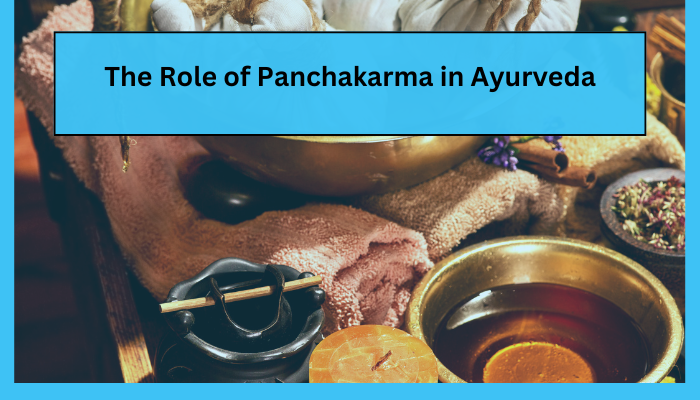Managing Diabetes Naturally with Ayurveda: Herbal Remedies and Diet
According to a study by The Hindu, around 100 million people in India have diabetes, and around 136 million have pre-diabetes. However, living with diabetes does not mean you only have to rely solely on modern medicine. Scientifically proven and trusted for over a thousand years, Ayurveda has offered natural ways to manage blood sugar levels and improve overall health.
In Ayurveda, diabetes is viewed not simply as a metabolic disorder. It is seen as a condition rooted in deeper imbalances within the body’s doshas (Vata, Pitta, and Kapha), digestive fire (Agni), and toxic buildup (Ama). Known as "Madhumeha" (meaning "honey urine disease"), diabetes is primarily seen as a Kapha-related disorder, though all three doshas may be involved.
Ayurveda treats diabetes holistically by addressing imbalances in doshas through dietary changes, herbal remedies, and detox therapies. Key treatments include-
- Kapha-balancing foods like bitter melon and turmeric,
- Herbs like Gudmar and Amla to regulate blood sugar,
- Panchakarma detox to cleanse toxins.
Regular exercise, stress management, and a stable routine support this approach. Shivam Superspeciality Hospital in Jaipur offers personalised Ayurvedic treatment for diabetes. Our experts combine traditional methods and modern expertise for balanced, effective diabetes management.
As recommended by Ayurvedic experts, here is a list of herbal remedies and dietary tips for managing diabetes with Ayurveda!
Ayurvedic Perspective on Diabetes
- Kapha Imbalance: Excessive Kapha leads to heaviness, sluggishness, and an accumulation of toxins, affecting insulin function and glucose metabolism.
- Agni (Digestive Fire) Weakness: Impaired Agni reduces the body’s ability to properly metabolise sugars and other nutrients, contributing to elevated blood sugar levels.
- Ama (Toxin Buildup): Poor digestion leads to Ama, or toxins, which further disrupt cellular functions, impair energy flow, and cause complications.
Classification of Diabetes in Ayurveda
Ayurveda categorises diabetes into two main types:
- Sahaja Madhumeha (Congenital/Hereditary Diabetes): This is akin to Type 1 diabetes, often linked to genetic predispositions.
- Apathyanimittaja Madhumeha (Lifestyle-Induced Diabetes): Similar to Type 2 diabetes, this form arises from poor lifestyle habits, excessive Kapha, and digestive imbalances.
Top Ayurvedic Herbal Remedies for Diabetes Control
Each ayurvedic herb supports balanced blood sugar levels and overall health. For best results, consult an Ayurvedic practitioner, especially for Type 1 diabetes, to ensure safe and personalised usage.
Gudmar (Gymnema Sylvestre)
Known as the "sugar destroyer," Gudmar reduces sugar cravings and controls blood glucose levels. For Type 2 diabetes, take 1-2 capsules (400-600 mg) daily or mix 1/2 teaspoon of Gudmar powder in warm water before meals. For Type 1 diabetes, consult a healthcare provider, as Gudmar impacts insulin levels.
Bitter Melon (Karela)
Bitter melon contains compounds that mimic insulin, which naturally lowers blood glucose. For Type 2 diabetes, drink 30 ml of fresh Karela juice on an empty stomach in the morning or consume 1-2 capsules daily. For those on insulin (especially Type 1), consult a practitioner, as it may cause hypoglycaemia.
Amla (Indian Gooseberry)
Amla, rich in antioxidants and vitamin C, supports pancreatic health and aids glucose uptake. Suitable for both Type 1 and Type 2 diabetes, consume 1-2 teaspoons of fresh Amla juice daily or 500 mg of Amla powder twice daily with water. If new to Amla, start with a smaller dose to avoid stomach discomfort.
Fenugreek (Methi)
High in soluble fibre, fenugreek slows carbohydrate absorption and reduces blood sugar spikes, making it ideal for managing Type 2 diabetes. Soak 1-2 tablespoons of fenugreek seeds overnight and eat them on an empty stomach, or take 500 mg of fenugreek powder twice daily with meals. It’s generally safe for Type 1 diabetes, but monitor blood sugar if used with insulin.
Turmeric (Haldi)
With anti-inflammatory properties, turmeric aids insulin sensitivity and overall metabolic health. Beneficial for both Type 1 and Type 2 diabetes, 1/2 teaspoon of turmeric powder with warm water or milk daily or 500 mg capsules twice a day can be taken. Combining it with black pepper improves its absorption and effectiveness.
Neem
Neem has detoxifying properties that help stabilise blood glucose and prevent diabetes-related complications. It is ideal for Type 2 diabetes. Take 1/4 teaspoon of neem powder or 1-2 neem capsules daily, or drink 20 ml of fresh neem juice diluted with water in the morning. For Type 1 diabetes, prolonged use should only be under professional guidance.
Safety Guidelines for Ayurvedic Herbs Consumption for Diabetes
Must-Follow Rules:
- Check blood sugar 2 hours after starting any herb.
- Start with 1/4th dose for the first 3 days.
- Stop if blood sugar drops below 70 mg/dL.
- Keep your doctor informed.
- Store herbs in air-tight containers.
Ayurvedic Dietary Tips for Diabetics:
An Ayurvedic diet for diabetes focuses on balancing the doshas, especially Kapha, which are linked to blood sugar imbalances. It emphasises foods stabilising blood glucose, improving digestion (Agni), and reducing toxin buildup (Ama). Here’s a guide to an effective Ayurvedic diet for managing diabetes:
- Focus on Bitter, Astringent, and Pungent Tastes
Bitter foods, like bitter melon and fenugreek, help detoxify and balance Kapha. Astringent foods like lentils, beans, and green vegetables slow sugar absorption. Aromatic spices, like turmeric and ginger, boost metabolism and support insulin function.
- Incorporate Low-Glycaemic, Whole Foods
Emphasise whole grains, like barley, quinoa, and millet, which release energy slowly and help stabilise blood sugar. Avoid refined sugars and processed foods that spike blood glucose. Opt for fresh, seasonal fruits like berries, apples, and pears, lower in natural sugars.
- Eat Fresh, Cooked Vegetables
Vegetables should be a central part of the diet. Include cooked greens (spinach, kale) and non-starchy vegetables (broccoli, cauliflower, and bitter gourd). Cooking vegetables makes them easier to digest and enhances nutrient absorption, essential for managing blood sugar.
- Spice Up Your Meals
Certain Ayurvedic spices improve digestion and metabolism, which can support blood sugar control. Use turmeric, cinnamon, fenugreek, cumin, and ginger regularly in meals. These spices add flavour and have natural properties to regulate blood sugar.
- Eat at Regular Intervals
Ayurveda emphasises eating meals consistently daily to support balanced Agni and prevent blood sugar spikes. Avoid skipping meals, and have a light breakfast, balanced lunch, and early dinner. Small, regular meals help stabilise energy and reduce hunger-induced sugar cravings.
- Stay Hydrated with Herbal Teas
Ayurveda recommends avoiding cold drinks and instead drinking warm herbal teas throughout the day. Teas made from fenugreek, ginger, and cinnamon can help balance blood sugar. Drinking warm water also supports digestion and reduces Kapha-related sluggishness.
- Avoid Heavy, Fried, and Sugary Foods
Limit heavy, oily, and fried foods, as they increase Kapha and Ama in the body, affecting blood sugar regulation. Avoid sweets, pastries, and high-sugar foods that can cause blood sugar spikes. Stick to light, warm, and easily digestible foods.
This Ayurvedic diet, regular exercise, and an active lifestyle can help manage blood sugar levels effectively. Consulting an Ayurvedic practitioner can provide personalised recommendations tailored to your dosha type and health needs.
7-Day Ayurvedic Diet Plan for Diabetes Management (Type 1 and Type 2)
Notes
- Type 1 Diabetes: This plan includes balanced meals to maintain steady blood sugar levels, focusing on whole grains, vegetables, and legumes. Snacks such as nuts, seeds, and low-sugar fruits help prevent sudden glucose drops.
- Type 2 Diabetes: This plan includes low-glycemic foods to control blood sugar and support digestion, as well as snacks like buttermilk, curd, and fresh fruits to satisfy hunger without causing blood sugar spikes.
This diet effectively manages blood sugar when followed with regular exercise and hydration. Always consult an Ayurvedic healthcare professional before starting any diet plan.
Foods to Strictly Avoid During Diabetes
Absolute No:
- White rice (spikes sugar +150-180 mg/dL)
- White bread (raises levels +120-140 mg/dL)
- Sugar drinks (increases +100-120 mg/dL)
- Processed snacks (+80-100 mg/dL spike)
Limit to Once Weekly:
- Sweet fruits (max 100g)
- Starchy vegetables (max ½ cup)
- Dairy products (max 1 cup)
- Red rice (max ½ cup)
Monitoring Your Diabetes Diet Success
Track These Daily:
- Pre-meal blood sugar
- 2-hour post-meal levels
- Water intake (min 3 liters)
- Meal timings
- Portion sizes
Expert Ayurvedic Treatment for Diabetes in Jaipur at Shivam Superspeciality Hospital
Shivam Superspeciality Hospital in Jaipur offers targeted Ayurvedic care for diabetes, blending traditional remedies with modern diagnostics.
Here’s their approach:
- Customised Herbal Treatments: To lower blood sugar, specific herbs like bitter melon and turmeric are tailored to each patient’s dosha balance.
- Personalised Diet Plans: Experts create diet plans based on Ayurvedic principles, emphasising low-glycemic foods, fibre, and metabolism-boosting spices.
- Panchakarma Detox Therapies: Panchakarma therapies cleanse the body and support stable glucose levels by eliminating toxins.
- Modern Diagnostics: Combining Ayurvedic care with tests like blood sugar monitoring ensures a thorough treatment plan.
- Continuous Monitoring: Shivam’s team adjusts treatments as needed, providing ongoing support for lasting diabetes control.
Shivam Superspeciality Hospital offers a holistic path to diabetes management by uniting Ayurveda and modern science.
Conclusion:
Ayurveda provides a natural, holistic approach to managing diabetes. Through customised herbal remedies, diet adjustments, and lifestyle changes, this ancient science targets the root causes of diabetes. By focusing on balancing the doshas, Ayurveda helps improve blood sugar control and supports overall wellness.
Shivam Superspeciality Hospital in Jaipur combines Ayurvedic expertise with modern diagnostics, offering patients personalised diabetes care. Consulting with Ayurvedic specialists is an effective step toward long-term health for those seeking sustainable, natural management.
















